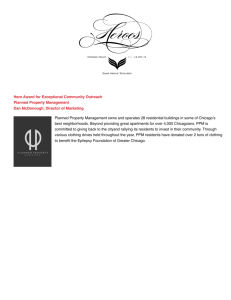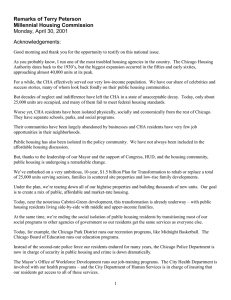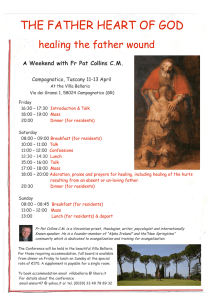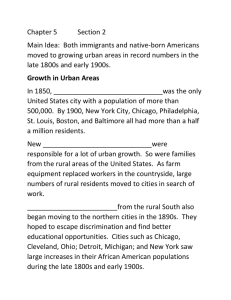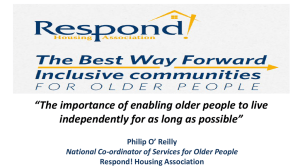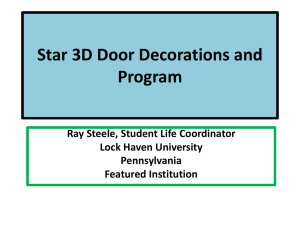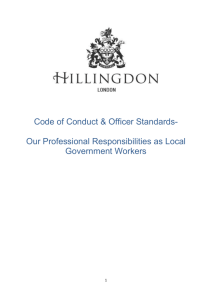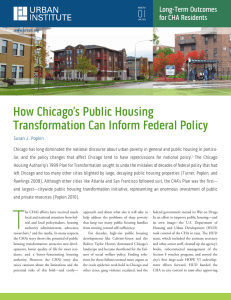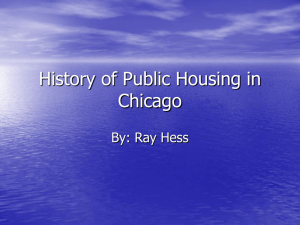A Decade of HOPE VI: Lessons, Remaining Questions
advertisement
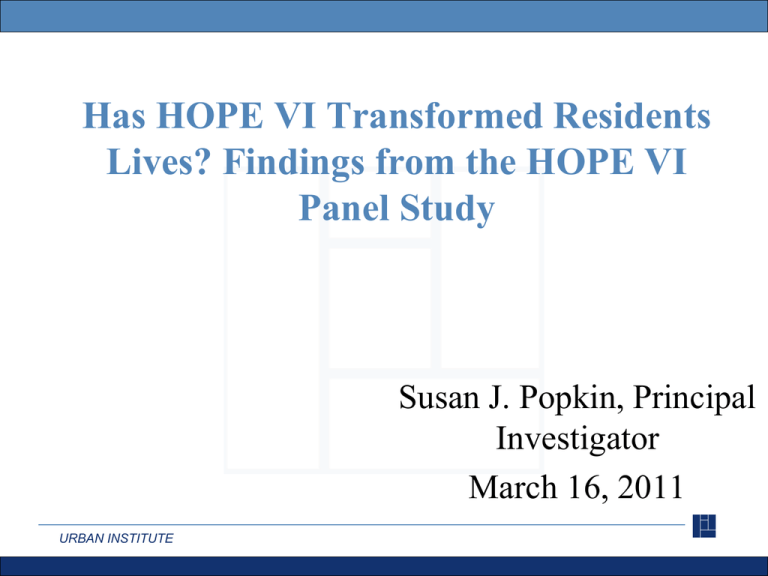
Has HOPE VI Transformed Residents Lives? Findings from the HOPE VI Panel Study Susan J. Popkin, Principal Investigator March 16, 2011 URBAN INSTITUTE The HOPE VI Panel Study Tracked the living conditions and well-being of residents from five HOPE VI sites. Residents were surveyed three times: 2001, 2003, and 2005 – – – – – Shore Park/Shore Terrace Wells/Madden Few Gardens Easter Hill East Capitol Dwellings URBAN INSTITUTE Atlantic City, NJ Chicago, IL Durham, NC Richmond, CA Washington, D.C. Sample Characteristics • Majority are African-American, single female heads of households • Extremely low-income – Employment rates low (22% full-time, 17% part-time) – Only half graduated high school • 75% have children; 42% have children under 6 • Approximately 10% are 62 and older URBAN INSTITUTE Relocation Outcomes, 2005 O th e r p u b lic h o u s in g /p ro je ctb a s e d S e ctio n 8 22% O rig in a l p u b lic h o u s in g H O P E VI 16% 5% H o m e le s s /in p ris o n 1% U n a s s is te d hom eowner 4% U n a s s is te d Vo u ch e r re n te r 43% 10% URBAN INSTITUTE Vouchers Holders Benefited in Many Ways • Improvements in housing quality – 70% reported that their current housing was better than their housing at baseline • Safer, less poor neighborhoods – At baseline, 79 percent of voucher holders reported big problems with drug trafficking, compared to 16 percent in 2005. • Improvements in mental health. – Voucher holders saw significant decreases in anxiety episodes between baseline and final evaluation. URBAN INSTITUTE HOPE VI Did Not Affect Employment B a rrie rs a n d L o w E m p lo y m e n t 70 W ith b a rrie r W ith o u t b a rrie r 60 P e rc e n t e m p lo ye d 50 40 30 20 10 0 S e ve re m ob ility D e p ress ion A s th m a N o hig h sch o ol C h ild u n de r C h ild ca re age 6 pro b le m s ed u ca tio n E m p lo ym e nt b a rrie r URBAN INSTITUTE A n xie ty Poor Health is the Biggest Challenge • Just 59% report excellent or good health, strong predictor of morbidity (disease) and mortality. • Very high rates of arthritis, asthma, obesity, depression, diabetes, hypertension, and stroke; – For every condition except obesity, HOPE VI sample rate is twice that of comparable national average (African American women) • Mortality rates are extremely high URBAN INSTITUTE CHA Panel Results, 2009 • Surveyed just Chicago families in the summer of 2009. • Residents saw improvements across many domains – Improved housing quality—few housing problems, even in public housing – Dramatic improvements in safety—less than 1 in 5 report serious problems – Significant reductions in anxiety and worry. • Physical Heath continued to deteriorate – Increased levels of chronic conditions and disability – Shocking mortality levels, 14% of Chicago residents were deceased by 2009 URBAN INSTITUTE Conclusions: Most Residents Are Better Off • For private market and mixed-income movers, HOPE VI has more than met the goal of providing an improved living environment • Those who remain in traditional public housing have not realized same benefits • The problem of the hard to house requires a different approach URBAN INSTITUTE HOPE VI Is Not the Solution for the “Hard to House” • The Chicago Family Case Management Demonstration – Informed by lessons from the HOPE VI Panel Study. – Enhanced supportive services for all residents in two CHA developments with hope of assisting most vulnerable households. – The Demonstration ran from 2007 through 2010 IN 2 CHA developments. – Comprehensive evaluation URBAN INSTITUTE The Chicago Family Case Management Demonstration Success Succeeded in implementing wrap-around services, improved outcomes for families – Higher quality housing, safer neighborhoods – Employment gains – Overall physical remained stable, reductions in anxiety and worry. • There is still need for improvement – Mortality rates were shockingly high. – Did not improve outcomes for children and youth URBAN INSTITUTE Moving Forward • Long Term Outcomes Study – Will survey Demonstration and CHA families in the summer of 2011. • Housing Opportunities and Services Together (HOST) – Test different models using housing as a platform for services for vulnerable families – Range out housing settings – Inform next generation of housing policy URBAN INSTITUTE
